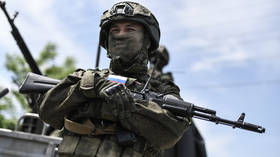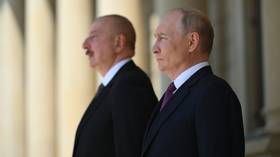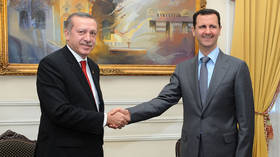Here’s why Russia won’t talk to Ukraine

Ukraine is not a sovereign state. Russia is dealing with an entity that isn’t acting in its own interests, and one operating directly on its borders at that. Therefore, interaction with such a territory – including formal negotiations – would be outside the usual customs governing relations between normal countries.
International politics – even war – is always a process of interstate relations. But how can you deal with a – frankly suicidal – actor which is capable of committing acts that could lead to its own total disappearance, while acting as a tool in the hands of another power that determines its strategy and behavior?
Even countries like South Korea, Japan and Germany, which have been under de facto American occupation for more than 70 years, have a form of independent foreign policy. Indeed, they often strive for it, as their numerous attempts to maintain relations with Russia or China show. If Germany were nothing more than a supplicant to the US, no one in Washington would have felt the need to push for the blowing up of the Nord Stream pipelines in fall 2022.
However, if we see two distinct characteristics at play– the willingness to make total sacrifices and to carry out other people’s orders in matters of war and peace – then we are not dealing with a real state. It could be defined as many other things – a terrorist organization, a rebel movement or a private military company. However, the general rules do not apply to it; dealing with such an entity is beyond the pale.
It seems reasonable to suggest that this is the phenomenon Russia is dealing with in Ukraine, and that the current bloodshed is a result of the failure of attempts to build a proper state after the collapse of the USSR in 1991. Everything else – including Kiev’s tactical decisions – is then a consequence of the failed attempt to build a viable country.
This is rather unfortunate. Firstly, because it leads to deaths among the Russian military personnel – and ordinary citizens. Secondly, because we seriously believed that getting rid of the Soviet “overreach” would finally allow Russia to engage in its own development and not just have to pour resources into the military. Although, of course, defense against external enemies was originally the main function of Russian statehood. We can only hope that the Ukrainian tragedy will be an isolated event.
The phenomenon of armed struggle against a non-state actor – in international terms – itself involves several peculiarities. They distinguish it, even in the abstract, from the norms characteristic of conventional global politics. It seems important to recall them in conditions when Russia once again finds itself in a situation that does not conform to traditional foreign policy norms. Due to geographical proximity – this is not far away Afghanistan – we will have to solve this problem with all the stubbornness, persistence – and tolerance for pain – that are characteristic of the Russian foreign policy culture.
Firstly, states and their organs often enter into negotiations with non-state adversaries. However, the objective of such negotiations is different from that of conventional diplomacy. In the case of traditional interstate relations, the goal of a political settlement is to achieve a relatively durable peace in which the parties recognize each other’s existence and status. In the case of a terrorist organization, for example, such mutual recognition is not possible. Simply because they are fundamentally different entities - the living cannot make a deal with the dead, and stone cannot find common ground with wood.
The aim of any negotiation with terrorists is therefore to solve a short-term problem. Usually in the context of a threat that cannot be eliminated at that moment. In other words, negotiating the release of hostages or the like. But such interaction does not entail recognizing the right to exist of those responsible.
Second, the fact that an adversary is not a state does not necessarily mean that it is weak. On the contrary, history is replete with examples of rebel movements or terrorist networks that were very well armed and posed a major threat for decades. In this case, the key factor is control over territory and/or population. If these are significant, a non-state adversary may have significant resources to encourage the population to fight on its side, including by using force. This is especially true if it is fueled from outside, as has been the case with extremist movements in the North Caucasus, Syria or Ulster, where Irish militants have long received money and weapons from the United States – and further afield – to fight the British presence.
History is also littered with examples of territories that remained outside state control long enough for their interim rulers to secure a base of mobilization. In Cambodia, even after the Khmer Rouge regime was overthrown by Vietnam, parts of the country remained under the control of this radical movement for a long time.
Third, powers that exert external control over non-state actors never link their security to their own survival. This means that they cannot fully understand the possible response of their adversary to the actions of their proxies.
Some observers have pointed out that many of the radical movements in Syria, for example, receive support from abroad. China once actively used radical Marxist movements in Southeast Asia and provided them with various forms of assistance. However, this was not a reason to turn its relations with countries where such groups were active into a state of war. The USSR also supported various rebel groups operating against the US and its allies. But it did not see this as a reason for war.
From the point of view of any normal state, the only reason to go to war with another state is direct aggression against its territory. It is possible that this is why the US government does not believe that its actions in the case of Ukraine could lead to the direct conflict with Russia that the Americans fear.
Finally, an armed struggle against a non-state actor does not mean that the population in the territory under its control is uniformly hostile. A significant proportion of them may, of course, sympathize with their captors and even associate certain personal plans for the future with them. But the majority are usually either putting up with it, or politically passive, and simply waiting to see how their fate will be resolved without their participation. It is therefore always a moral dilemma for traditional states to use force where it may lead to civilian deaths. Because the victims can be their own people.
Much depends on the national culture – Americans or Western Europeans, because of their inherent racism, are capable of killing civilians en masse if they have to. In Russia, customs are different, especially when it comes to our immediate neighborhood.
Non-state actors, on the other hand, are not constrained by anything – they are driven by external instructions, or ideological motives. That is why acts of terror on their part are perfectly normal.
In the case of Ukraine, Russia, is dealing with a rogue state that isn’t acting in the interests of the people under its control. Understanding this is fundamental when assessing current events.
This article was first published by ‘Vzglyad’ newspaper and was translated and edited by the RT team.
















